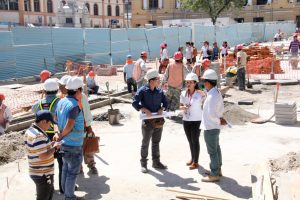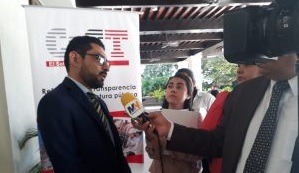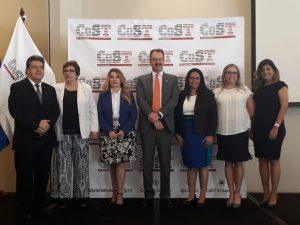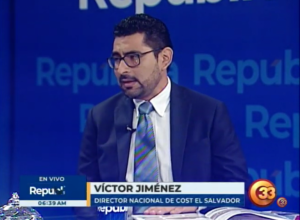‘’I am delighted that we can now officially announce our membership of CoST. Our commitment to CoST is an important step towards achieving better outcomes from our investment in public infrastructure. We are proud to stand alongside the founding CoST countries and look forward to seeing the positive impact on our economy for our citizens.’’
Gerson Martinez, Minister of Public Works 2011-2017
Prior to CoST: Public infrastructure in context

El Salvador faces ongoing issues of corruption: according to the 2020 Corruption Perceptions Index from Transparency International, it has a score of 36/100, and is ranked 104 out of 180 countries measured. Several corruption scandals, including the Odebrecht scandal, have implicated high-level government officials in El Salvador and all three presidents from the years 1999-2014 have been charged due to corrupt practices.
Historically, public infrastructure in El Salvador has been notorious for issues surrounding corruption, mismanagement and inefficiency resulting in poor quality infrastructure and time and cost overruns. For example, a highway project linking San Salvador with the nearby municipality of Santa Tecla was started in 2005 and completed five-and-a-half years behind schedule, costing almost four times the original budget of US$25.6 million.
However, notable strides have been made to combat corruption, including the creation of an independent commission in 2019 to tackle corruption called the International Commission Against Impunity in El Salvador (CICIES) through presidential decree. El Salvador is also a member of the Open Government Partnership, and the implementation of CoST was included in its 2014-2016 National Action Plan. The Law on Access to Public Information (Ley de Acceso a la Información Pública), introduced in 2011, is also a key tool for citizen participation in public procurement and budgeting.
CoST El Salvador: How it all began
El Salvador joined CoST in 2013, when a memorandum of understanding was signed between CoST and the Ministry of Public Works, Transport and Housing to launch its membership. This committed the Ministry to disclose information on at least three high profile construction projects over 18 months.
In the run up to launch, the Ministry ran a series of workshops to develop the design and implementation of the CoST El Salvador programme. These were attended by a range of representatives who drew on their diverse experience to support the Ministry in this respect. These representatives came from organisations such as the Salvadoran Chamber of Construction, USAID and the Initiative for Social Democracy.
The four features of CoST
The CoST approach is focussed on four core features: disclosure, assurance, multi-stakeholder working and social accountability. These features provide a global standard for CoST implementation in enhancing infrastructure transparency and accountability.
Disclosure in El Salvador

The disclosure process ensures that information about the purpose, scope, costs and execution of infrastructure projects is open and accessible to the public, and that it is disclosed in a timely manner.
CoST El Salvador’s First Assurance Report was published in 2017 and measured levels of disclosure against the CoST Infrastructure Data Standard (CoST IDS). The CoST IDS requires 40 datapoints to be disclosed proactively (without request) across the project cycle, with 27 additional datapoints to be disclosed reactively (upon request). However, after the first assurance process, CoST El Salvador’s Multi-Stakeholder Group (MSG) conducted a review to explore whether these indicators could be better adapted to El Salvador’s public infrastructure sector. The review concluded that requiring a total of 79 indicators to be disclosed proactively would be more appropriate, and CoST El Salvador adapted the CoST IDS to reflect this.
Legal mandate on disclosure
Legal mandates on disclosure are powerful tools to encourage rapid data disclosure. A legal mandate on disclosure was implemented in March 2019, requiring all procuring entities from central, municipal and autonomous governments to disclose information according to CoST El Salvador’s 79 indicators. With this mandate established, we expect to see disclosure rates continue to increase, as evidenced recently by the leap in rates between CoST El Salvador’s second and third assurance processes.
Online disclosure platform
In October 2017, CoST El Salvador launched the ‘Single Information System on Public Infrastructure’ (SUIP), an online platform which offers Salvadoran citizens access to clear and concise data on public infrastructure projects. The SUIP was designed primarily with ordinary citizens in mind. It presents information in a clear and accessible format and uses cloud technology to ensure that information is securely stored. By presenting information online through the platform, citizens can better understand how public money is being spent and be empowered to hold decision-makers to account.
SUIP was supported by the British Embassy in El Salvador, and follows a Memorandum of Understanding which signed in 2017 between CoST El Salvador and the Institute for Access to Public Information (IAPI). The Memorandum of Understanding focused on furthering good practice in the implementation of public infrastructure projects using the CoST IDS.
Assurance in El Salvador

We promote accountability through the CoST assurance process – an independent review of the disclosed data by assurance teams appointed by CoST national programmes. The teams identify key issues of concern in relation to the items listed in the CoST IDS and put technical jargon into plain language. This allows social accountability stakeholders to easily understand the issues and hold decision-makers to account.
Three assurance reports have been published by CoST El Salvador. As mentioned above, CoST El Salvador’s First Assurance Report was published in 2017, followed by its second in 2018. The second assurance process assessed 20 infrastructure projects with a combined value of US$ 58.6 million and found an average of 38.5% of data was disclosed – 58% reactively and just 19% proactively. The CoST team presented these findings at a launch event held at Universidad Tecnológica de El Salvador, San Salvador, convening key members of the media, civil society, academia, government and the private sector.
CoST El Salvador’s Third Assurance Report assurance process was held in 2019 and assessed 14 infrastructure projects from transport, energy, education and health sectors. With a combined value of US $300 million, the assurance report showed an overall disclosure rate of 73.5%. However, concerns over time and cost overruns were also raised in the report, and cost increases have totalled US $6.4 million across the projects. In addition to holding an assurance report launch, Victor Jiménez, the CoST El Salvador programme manager, embarked on a series of high-level media appearances in order to publicise the findings of the report.
Multi-stakeholder working in El Salvador
CoST brings together stakeholder groups with different perspectives and backgrounds from across government, private sector and civil society. Through each national programme’s Multi-Stakeholder Group, these entities can guide the delivery of CoST and pursue infrastructure transparency and accountability within a neutral forum.
CoST El Salvador’s Multi-Stakeholder Group is made up of representatives from nine organisations from across government, the private sector, academia, and civil society. These organisations include the Salvadoran Chamber of Construction, University of El Salvador and the Social Transparency and Open Data Transparency Association.
Social accountability in El Salvador

CoST works with social accountability stakeholders such as civil society and the media to promote the findings from its assurance process so that they can then put key issues into the public domain. In this way, civil society, the media and citizens can all be aware of issues and hold decision-makers to account.
Since 2018 CoST El Salvador has been training civil society groups and public officials, with a view to further citizen engagement in public infrastructure. This is an area where CoST El Salvador will continue to focus its efforts in 2020 and will partner with other institutions such as the Institute for Access to Public Information. These training sessions will predominantly focus on disclosure of the 79 indicators as adapted from the CoST IDS.
CoST El Salvador has also designed a structured communications strategy for 2020, which will be employed to establish clear objectives for its public engagement. This includes increased participation in a variety of media such as the radio, print and TV.
CoST El Salvador Assurance Reports
CoST El Salvador First Assurance Report (Spanish)
CoST El Salvador Second Assurance Report (Spanish)
CoST El Salvador Third Assurance Report (Spanish)
Get in touch
CoST El Salvador Country Manager
Victor Jiménez
elsalvador@infrastructuretransparency.org